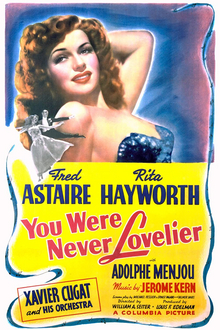|
You Were Never Lovelier
You Were Never Lovelier is a 1942 American musical romantic comedy film directed by William A. Seiter and starring Fred Astaire and Rita Hayworth. The supporting cast also features Adolphe Menjou, Xavier Cugat and Adele Mara. The music was composed by Jerome Kern and the lyrics by Johnny Mercer.[2] The picture was released by Columbia Pictures and includes the elaborate "Shorty George" and romantic "I'm Old Fashioned" song and dance sequences. The film, a Hollywood remake of the 1941 Argentine romantic comedy Los martes, orquídeas (On Tuesdays, Orchids),[3] is set in Buenos Aires. PlotRobert "Bob" Davis is a well-known American dancer with a weakness for betting on the horses. After he loses his money gambling in Buenos Aires, he goes looking for a job with Eduardo Acuña, the wealthy owner of a nightclub. Acuña, however, does not wish to see him. Bob's friend, bandleader Xavier Cugat, invites him to perform at the wedding of Acuña's eldest daughter, Julia. Acuña insists his daughters must wed in order of age, from oldest to youngest. Maria is next in line to get married but refuses to, much to the disappointment of her two younger sisters, Cecy and Lita, who both have boyfriends and want to marry as soon as possible. During Julia's wedding reception, Bob is attracted to Maria, but his advances are rebuffed by her, and she refuses to speak to him. While talking with Acuña, Bob remarks that Maria's personality is like "the inside of a refrigerator". Aware of his younger daughters' plight, Acuña works out a plan: he sends orchids and anonymous love notes from a supposed secret admirer to Maria to help get her in the mood. One day, when Bob once again tries to see Acuña at his office, Acuña orders the unseen Bob, mistakenly assuming him to be a bellboy, to deliver the latest note and flower. Maria, who by now is feeling amorous and eagerly awaiting the next love letter from her secret admirer, sees Bob dropping off the note and flower and assumes that he is her admirer. When Maria sees Bob at her father's office, she asks her father to introduce them and invite Bob to dinner. At the dinner, after Mrs. Acuña almost shoots Bob, Maria invites Bob to the garden, where they dance. Finding that Maria is truly in love with Bob, Mr. Acuña makes a deal with Bob: in exchange for a contract to perform at the club at some later, unspecified date, Bob will court Maria and repel her with his "obnoxious" personality. Despite Bob's efforts to disappoint Maria, the two quickly fall in love. With his plan gone awry, Acuña orders Bob to leave Buenos Aires. At the Acuña's 25th anniversary, Mr. Acuña plans to compose a farewell love note from Bob while Cecy and Lita try to separate Bob and Maria, but fail. Mrs. Acuña sees him writing the note in his office and accuses him of cheating on her with another Maria, her dear friend Maria Castro. While Mr. Acuña tries to defend himself, Bob and Maria come into the office, where Bob has to confess that he has not been writing the love letters to Acuña's daughter, disappointing Maria, who apologizes to Maria Castro. Impressed by Bob's behavior, Acuña grants him permission to begin dating Maria. After repeated deliveries of flowers fail to impress Maria, Bob asks for Mr. Acuña's help, who tells him about Lochinvar, a fictional knight who was Maria's first love interest. Bob imitates him and tries to dance, which impresses Maria who decides to forgive Bob and stay with him. Cast
ProductionThe film was the second of two films starring the duo of Astaire and Hayworth,[4] following the box-office success of the previous year’s You'll Never Get Rich. The new film avoided the wartime themes of the previous film, while benefiting from lavish production values – a consequence of the box-office success of the earlier film. Kern created a standard with "I'm Old Fashioned". Initially, Kern was unhappy about the selection of Cugat and his orchestra; however, when production was complete, he was so pleased with the band's performance that he presented Cugat with a silver baton. Although Hayworth had a fine voice, Harry Cohn insisted on her singing being dubbed throughout by Nan Wynn. The film is a reworking of the 1941 Argentine musical Los martes, orquídeas (On Tuesdays, Orchids) directed by Francisco Múgica.[5] It follows the usual conventions established by Astaire in his earlier musicals, such as an anti-romantic first meeting between the two leads, a virtuoso dance solo for Astaire, a playful dance duet and a romantic dance duet. Key songs/dance routinesThe film's dance director was Val Raset, the only time he collaborated with Astaire, and his choreographic input into the film is unclear. According to Astaire’s biography, he worked out all the numbers with Hayworth while rehearsing above a funeral parlour. Although the setting is a Latin one, Kern felt unable to compose in this style, but Astaire was determined to continue his exploration of Latin dance, which he did with the help of special arrangements by Cugat and Murphy, and the inspiration provided by the enthusiastic and talented Hayworth. This became an important counterbalance to Kern’s tendency to compose sweet, occasionally saccharine, melodies. Hayworth's performance here establishes her claim as one of Astaire’s foremost dance partners.
Award nominationsThe following received Academy Award nominations:[7]
References
Bibliography
External links |
||||||||||||||||||||||||||||||||||||
